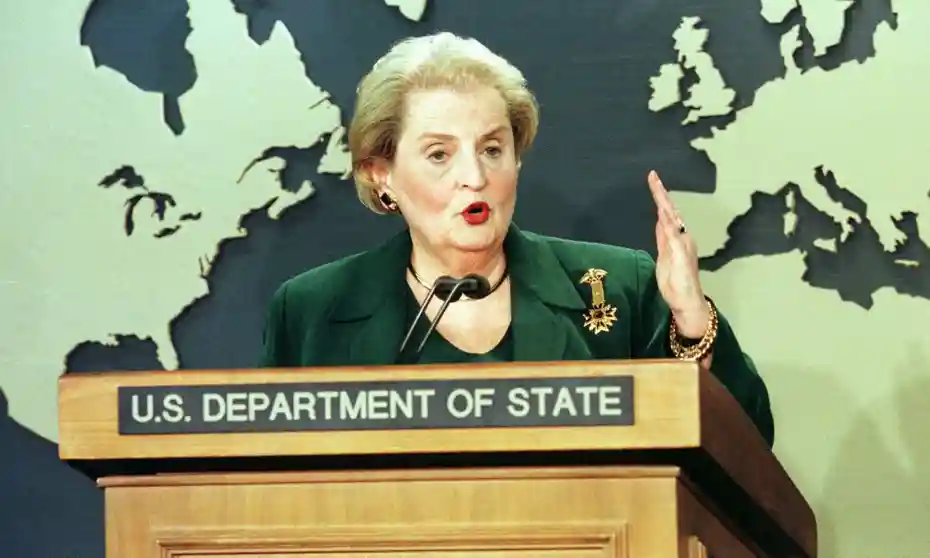Madeleine Albright, 1937-2022
A trailblazing diplomat has died at 84.

Washington Post (“Madeleine Albright, first female secretary of state, dies at 84“):
Madeleine K. Albright, who came to the United States as an 11-year-old political refugee from Czechoslovakia and decades later was an ardent and effective advocate against mass atrocities in Eastern Europe while serving as U.S. ambassador to the United Nations and the first female secretary of state, died March 23 in Washington. She was 84.
The cause was cancer, her family said in a statement.
Before Dr. Albright, the inner sanctum of U.S. foreign policymaking had been an almost exclusively male domain. In many ways, her politically fraught early life — enduring Nazi and communist repression — impelled her rise to the highest levels of international politics.
Her family, which was Jewish, narrowly avoided extermination at the hands of the Nazis. They fled to England shortly after Hitler’s tanks rolled into Czechoslovakia in 1938.
Several of Dr. Albright’s relatives, including three grandparents, died in the concentration camps of Theresienstadt and Auschwitz. After the war, Dr. Albright’s father, a Czech diplomat wary of communism, feared he would be arrested following a 1948 coup by hard-line Stalinists in Prague. The family escaped once more, this time to the United States.
“I had this feeling that there but for the grace of God, we might have been dead,” Dr. Albright said much later. She said that she was drawn to public service to “repay the fact that I was a free person.”
Her ascent in the foreign policy establishment reflected the traditional roles of women in the 1950s and 1960s and her ambition, which was influenced by the nascent feminist movement that encouraged women to pursue professional careers.
After studying political science at the all-female Wellesley College, she married a wealthy newspaper heir and began a family. When her twin daughters were born prematurely and placed in incubators, Dr. Albright passed time in the hospital by teaching herself Russian.
She became an influential Georgetown salon leader and skilled fundraiser at Beauvoir, the elite private school in Washington that her daughters attended. In 1976, she earned a doctoral degree in public law and government at Columbia University, where she studied under Zbigniew Brzezinski, a fellow refugee from Eastern Europe.
When Brzezinski was named national security adviser following the 1976 election of Jimmy Carter as president, he brought Dr. Albright into the White House as his congressional liaison. She was one of just two women on Brzezinski’s staff and occupied a windowless cubbyhole in the West Wing, but Dr. Albright relished her proximity to power.
The biggest catalyst to Dr. Albright’s career may have occurred in 1982 when her husband left her for another woman. Although she was initially devastated, the divorce settlement made her a millionaire.
She began raising money for Democratic presidential hopefuls, which led to jobs as foreign policy adviser to Rep. Geraldine Ferraro (D-N.Y.), the first female major-party nominee on a presidential ticket, and to Massachusetts Gov. Michael Dukakis (D) during his doomed 1988 presidential run.
While working for Dukakis, Dr. Albright met Bill Clinton, a onetime Rhodes scholar who was then the governor of Arkansas and wanted to build a national reputation for himself. Dr. Albright wrote a letter of recommendation that helped Clinton gain membership to the Council on Foreign Relations, a prestigious New York think tank. When Clinton was elected president in 1992, Dr. Albright ran his National Security Council transition team and was named ambassador to the United Nations.
New York Times (“Madeleine Albright, First Woman to Serve as Secretary of State, Dies at 84“):
Madeleine K. Albright, a child of Czech refugees who fled from Nazi invaders and Communist oppressors and then landed in the United States, where she flourished as a diplomat and the first woman to serve as secretary of state, died on Wednesday in Washington. She was 84.
[…]
Enveloped by a veil of family secrets hidden from her for most of her life, Ms. Albright rose to power and fame as a brilliant analyst of world affairs and a White House counselor on national security. Under President Bill Clinton, she became the country’s representative to the United Nations (1993-97) and secretary of state (1997-2001), making her the highest-ranking woman in the history of American government at the time.
It was not until after she became secretary of state that she accepted proof that, as she had long suspected, her ethnic and religious background was not what she had thought. She learned that her family was Jewish and that her parents had protectively converted to Roman Catholicism during World War II, raising their children as Catholics without telling them of their Jewish heritage. She also discovered that 26 family members, including three grandparents, had been murdered in the Holocaust.
With her father, a diplomat, probably facing execution, the family’s odyssey from a Europe on the brink of World War II to safety in America took 10 years and two escapes to London. The first came as Nazi troops invaded Czechoslovakia in 1939, and the second came after the family’s postwar repatriation, when Czech Communists with Soviet support overthrew the government of Czechoslovakia in 1948.
In America, Madeleine Korbel was a gifted student, married into the wealthy Albright-Medill newspaper family and wrote many books and articles on public affairs. She also climbed the ranks of the Democratic Party to pinnacles of success as a counselor to President Jimmy Carter and as a foreign policy adviser to three presidential candidates: former Senator Walter F. Mondale of Minnesota in 1984, Gov. Michael S. Dukakis of Massachusetts in 1988 and Mr. Clinton in 1992. She was also the campaign foreign policy adviser to Geraldine Ferraro, the first woman to run for vice president.
She was largely unknown until Mr. Clinton took office as president in 1993 and named her chief delegate to the United Nations. Over the next four years, she became a tough advocate for the global interests of the United States.
Wall Street Journal (“Madeleine Albright, First Woman to Serve as U.S. Secretary of State, Dies at 84“):
Madeleine Albright, who as secretary of state during the Clinton administration became the first woman to serve as the nation’s top diplomat, died Wednesday of cancer. She was 84.
Ms. Albright presided over U.S. diplomacy in the aftermath of the Cold War, renegotiating the nation’s relationship with Russia and advocating the enlargement of the North Atlantic Treaty Organization by including former Soviet states.
Her own experiences with authoritarian governments during her formative years shaped Ms. Albright’s approach to the world and meant she paid particular attention to issues in Eastern Europe. Her native Czechoslovakia fell under the sway of first Adolf Hitler, then Joseph Stalin, leading her family to flee the country.
“She was so smart, so well-informed and level-headed,” former President Bill Clinton said on CNN Wednesday. Mr. Clinton said he talked to Ms. Albright two weeks ago. “She spent the entire conversation talking about how Ukraine had to be defended,” he said.
A facility with languages—she spoke fluent Czech and French, and conversational Polish and Russian—enhanced her ability to build rapport with foreign counterparts.
[…]
As the first female secretary of state, Ms. Albright established a pattern that quickly became familiar: Two of the next three people to hold the post, Condoleezza Rice and Hillary Clinton, were women.
At the time of her appointment, Ms. Albright was the highest-ranking woman ever in the U.S. government; she later described her initial trepidation and facing sexist opposition not from foreign counterparts, but from Americans, although she expressed pride that other women followed her into the top diplomatic post.
While campaigning for Mrs. Clinton during the 2016 presidential race, Ms. Albright drew criticism for saying, “There’s a special place in hell for women who don’t help each other.” Some prospective Democratic voters took umbrage at Ms. Albright, who was invoking an adage she had frequently used over the years.
Reuters (“Madeleine Albright, former U.S. secretary of state and feminist icon, dies at 84“):
Madeleine Albright, who fled the Nazis as a child in her native Czechoslovakia during World War Two then rose to become the first female U.S. secretary of state and, in her later years, a pop culture feminist icon, died on Wednesday at the age of 84.
[…]
“Madeleine Albright was a force. She defied convention and broke barriers again and again,” U.S. President Joe Biden said. He directed U.S. flags be flown at half-staff at the White House and government buildings, including embassies, until March 27.
She was a tough-talking diplomat in an administration that hesitated to involve itself in the two biggest foreign policy crises of the 1990s – the genocides in Rwanda and Bosnia-Herzegovina.
She once upset a Pentagon chief by asking why the military maintained more than 1 million men and women under arms if they never used them.
The plain-spoken Albright took a tough line on a 1996 incident where Cuban jet fighters downed two unarmed U.S.-based planes, saying: “This is not cojones, this is cowardice,” using a Spanish vulgarity meaning “testicles.”
[…]
Once the Clinton years and the 1990s were over, Albright became an icon to a generation of young women looking for inspiration in their quest for opportunity and respect in the workplace. Albright was fond of saying: “There’s a special place in hell for women who don’t help each other.”
Albright was a marked contrast to her predecessors and male colleagues in uniform suits. She used clothes and jewelry to send tart, political messages. One favorite was a snake brooch, a reference to Iraqi leader Saddam Hussein calling her an “unparalleled serpent.”
She wrote a book about her signature jewelry, one of several bestsellers, explaining that the pins were a diplomatic tool. Balloons or flower pins would indicate she felt optimistic, while a crab or turtle would indicate frustration.
That each of the reports has significant details not covered in others speaks to the remarkable richness of her life as well as the wild social changes in her time. It seems wild now that was quite controversial in 1997 that a woman would be the nation’s chief diplomat. But it was.
I did not know until reading the obits that she was born Marie but changed her name to Madeleine as a child studying French in Switzerland. Or that there was a purpose behind the giant pins she wore.
She spoke to us at the Atlantic Council many times and was always interested. Her foreign policy was much more interventionist than my taste but, given her history, a fierce desire to help the weak and oppressed was certainly understandable.






I read an editorial she penned for the NYTimes a little more than a month ago analyzing Putin’s moves leading toward the Ukrainian invasion. Cancer is no easy exit, but to be that engaged a month before her death is another testament to her being a badass.
A trivial note, to be sure, but I found out yesterday when reading about Albright’s life that she was only 4’10”. A small person who had a very large presence on the world stage.
I was pleasantly surprised to see some of my younger friends posting social media tributes to her. I was not aware of her currency in feminist pop culture.
She was a great woman. May she rest in peace.
Madeleine Albright was cut from the same cloth as Margaret Thatcher. Tough, resilient and clear headed about what they believed and relentless champions of the ideals that they advocated.
RIP